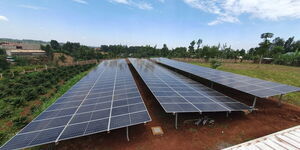A report published by African Development Bank (AfDB) on Wednesday, May 25, explained why a number of investors had left Kenya in recent months.
According to the 2023 African Economic Outlook (AEO) report, capitalists fled Kenya to search for safe assets.
Their decision weighed down on Kenya's growth momentum as investors withdrew their money from the Nairobi Securities Exchange (NSE), aggravating the recent slump in stock, bonds and Treasury Bills.
According to African Economic Outlook, the weakening Kenyan shilling caused anxiety among investors prompting some to explore other markets.
The same downsizing effect on investors fleeing was felt in Nigeria and South Africa, ranked as major economies in Africa.
" Currency weaknesses in some of Africa’s more globally integrated economies (Kenya, Nigeria, and South Africa) are expected to persist in 2023, largely due to potential capital outflows as investors search for safe assets in advanced economies," the report read in part.
The report further showed that investors sought other investment options due to decreased external demand for the Kenyan shilling. The uncertainty pushed them to find alternative safe investment assets.
"Currency weaknesses in some of Africa’s major economies—Kenya, Nigeria, and South Africa—are expected to persist in 2023, due largely to tighter global financial conditions and weak external demand," it added.
Besides stocks hitting a nosedive, the country lost two major investors in the Lake Turkana oil exploration project. Africa Oil Corp exited the Kenyan market to focus on its operations in Namibia, withdrawing its investment which stood at Ksh8 billion as of December 31, 2022. Total Energies also withdrew its bid to invest in the oil project.
AfDB, however, noted that depreciation rates could ease later in 2023, reducing the pressure on President William Ruto's administration.
It also observed that Ruto's government would change the situation by turning attention to the untapped natural capital as a complementary source of financing.
According to economists and experts who pieced together the report, Kenya's recovery would be reinforced by expected improvements in global economic conditions, fueled by China’s reopening and a downward adjustment of interest rates as the effects of monetary policy tightening on inflation.
Ruto's Plan to Strengthen the Shilling
President Ruto adopted a government-to-government model to import fuel into the country. The Head of State noted that the deal with Saudi Arabia was key to addressing the weakening Kenyan shilling.
Currently, the exchange rate of the Kenyan shilling against the dollar stands at Ksh138.25, according to the Central Bank of Kenya (CBK) indicative rates released on Thursday, May 25.
On April 11, President Ruto promised to lower the exchange rate to Ksh120. He thus directed CBK to reinstate the interbank exchange market.
"We have been having conversations with the Central Bank to reinstate the inter-bank exchange market that has since not worked and I am happy that the players in that sector are working with CBK so that we can again take charge of our market," he stated.
He blamed brokers for hoarding dollars, causing an artificial shortage in the country.












